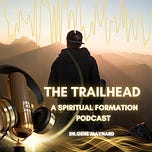Eucharist-O is a playful name for a contemplative practice highlighting the indispensable practice of giving thanks. Today’s focus is on the connection between courage and giving thanks. The act of giving thanks is an act of brazen boldness. To read a post on this topic, head over to my Substack page to read the article called, “Eucharist-O: Why It Takes Courage to Be Thankful.”
Here are three reasons why giving thanks is an act of brazen boldness:
It is an act of defiance
Life is difficult. There are two reasons you might not realize this. First, you may have been raised in a protective environment that shielded you from hardships, ultimately hindering your growth. Second, when you went out into the world exploring and faced challenges, you may have retreated to the safety of strong people for protection or resorted to things that soothed you, preventing you from fully growing up and facing the harsh realities of life. The reality is that life is difficult and mental and spiritual toughness is needed.
When we see spiritual and mental toughness in action, we see people defiantly giving thanks in the face of challenges that threaten to undo them. There is no better example of this than Jesus. If you get a lot of things right about Jesus but miss his brazen boldness, you fail to understand who He is—and who we can become. Jerusalem, for Jesus, was a threatening place filled with powerful forces that wanted to tear him apart. This is why his followers were aghast when he announced he was heading to Jerusalem. But we are told he was not deterred by their weak resolve and resolutely set out for Jerusalem (Luke 9:51). A better translation would be this: Jesus defiantly set out for Jerusalem. Or Jesus, filled with brazen boldness, set out for Jerusalem.
Arriving in time for the great Passover celebration, he took over that last supper, giving it fresh meaning that fortified his friends for years to come. Knowing threatening forces were gathered in the darkness of the evening, waiting for him to appear, he did two defiant, brazenly bold things:
First, he took a piece of bread and tore it into pieces and said, “This is what is about to happen to my body.” But rather than slumping back down into his seat, overwhelmed, and looking around for protection, he gave thanks! In Greek, he eucharisteo. (Luke 22:19). While I have playfully named this practice Eucharist-O from this Last Supper action, there is nothing playful about giving thanks. This is defiance! This is brazen boldness!
Then, the meal over, he left the table, opened the door, and walked out into the dark forces that waited to consume him singing a hymn of praise and thanksgiving. (Matthew 26:30). While the hymn was likely the Hallel from the Psalms, make no mistake about it: this was a hymn of defiance. This was a hymn of brazen boldness in the face of all he was about to endure.
Do you think Christian spirituality makes you weak? You’ve misunderstood badly! Christian spirituality makes you defy the darkness that seeks to overwhelm and defeat you. Giving thanks in the face of that darkness is an act of brazen boldness that weakens the power of darkness, liberates your spirit, and keeps you spiritually and emotionally afloat no matter the storms that come against you.
Thank you for reading! I appreciate all who support, subscribe, and share this independent endeavor with friends and family. If you haven’t already — please consider choosing a free or paid subscription as well as gifting a subscription to someone who would enjoy it.
It gives you a backbone
Giving thanks gives you a backbone. How else did the great apostle, Paul, endure the prison of Philippi? The accusations were unjust as was the sentence. Powerful economic leaders wanted him out of the way so they could continue to bolster their fortunes by trafficking unfortunate people. He had stood up to them and freed a trafficked young woman. The monied community had the political powers in their corner and Paul was badly treated, roughed up, bullied, thrown in prison, and the key was thrown away.
What happened next is one of the great stories in the annals of courage. Instead of slumping low and crawling about in defeat like a crustacean, we find him standing up tall, singing hymns, praising and giving thanks to God in the middle of surrounding darkness. The scene is made more powerful when we understand this act of straightening his back and bowing his neck against his oppressors happened at midnight. It likely was literally at midnight, long hours before the sun arose again. But even if it was high noon, it would have seemed like midnight to lesser spirits, unprepared with no practices to help them stand amid fierce challenges. While he sang, a clashing of the earth’s tectonic plates deep in the earth’s core beneath Philippi sent shock waves up to the earth’s surface. The shaking that occurred forced open the door of the jail. Lesser spirits might have fled, thinking the opened door was an answer to prayer and a golden chance to get out of Philippi and away from the powerful forces threatening to destroy them. Not Paul. He remained in the jail and continued to give thanks to God.
Do you think that Christian spirituality keeps peril and darkness far from you? That’s a grave error! Christian spirituality fortifies your spirit. It gives you a backbone. It empowers you to stand up in the face of calamity, injustice, and inhumanity with brazen boldness. As you strengthen your resolve and refuse to be intimidated by destructive forces, you will find the boldness to give thanks to God while you stand, not slump.
It resets reality
Giving thanks has the remarkable ability to change how we see the world. It’s easy to fall into the trap of thinking we deserve fair treatment and outcomes. However, the reality of life on this planet can be quite tough, and fairness is often an illusion. In confronting this truth, some may choose to postpone their gratitude until they feel they’ve received what they think is rightfully theirs. Yet, this choice can lead to a scarcity mindset, making us feel we lack what we truly need. As we observe others getting what we believe we deserve, feelings of resentment can start to take hold. So, how can I change my outlook and break free from this negative way of thinking?
Here is a simple suggestion:
First, take a moment to list 5 situations in your life that felt deeply unfair. Dig as far back as you need—these are the moments that still sting, the ones you would never consider giving thanks for, no matter the circumstances. Once you’ve identified them, rank them from 1 to 5, with 1 being the least unjust. We’ll begin with the one ranked #1, as it will be the easiest to confront, offering the least resistance in your journey to overcome the resentment you've carried and to find the courage to embrace thankfulness
Next, revisit the situation with fresh eyes, guided by time, experience, and maturity. You might need to do this in small doses, over the course of several walks, for example. The goal here is not to convince yourself that the situation wasn't as bad as you once thought, as if by some Jedi mind trick. Not at all. This situation made your list of five for a reason: from your perspective, nothing in that moment worked in your favor. You felt exposed, unprotected, and suffered loss while others seemed to benefit. Now, you can step back and reflect on the situation, discovering the things you had all along, or gained, during this trying time.
An illustration can bring clarity. I’d like to share my own attempt to work my way from resentment to thankfulness amid a trying circumstance. I’m offering this vulnerable example to help you see some of the steps you may have to take. Not everything has unfolded as I expected in my role as a pastor at this juncture in my life. It has created some unexpected difficulties. Those I thought would step up, intervene, and protect did not show up or take steps to show that they cared. A flood of emotion—anger, frustration, and a sense of unfairness—drug up old memories. I sense the looming presence of resentment within me. Consequently, I’ve been walking — long, reflective walks — to create the space and opportunity to examine this situation. One thing that keeps arising for me is the importance of not missing what I do have while living in the reality that some necessary things are missing right now. What I can report right now is that the list of important things I possess is growing much longer than the list of important things that are being withheld. The latter has to be resolved. But the more the eyes of my mind and heart open to see what I already have, the more my spirit is being freed from resentment to thankfulness.
The last step is straightforward: give thanks for all you now see that was never truly taken from you, even in the face of difficulties and setbacks. This is so important it needs to be stated more forcefully.
Let me say it again, like this: As an act of defiance against all the forces that seek to harm you, give thanks for all you have always possessed, or acquired, during this difficult situation.
But that’s still not quite strong enough: As an act of brazen boldness, stand up and give thanks for your blessings while weathering this stormy chapter.













Share this post